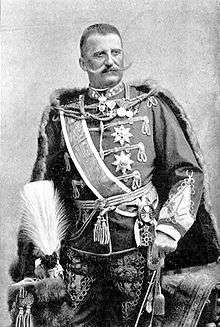Géza Fejérváry
Baron Géza Fejérváry de Komlóskeresztes (15 March 1833 – 25 April 1914) was a Hungarian general who served as the prime minister in a government of bureaucrats appointed by King Franz Joseph during the Hungarian Constitutional Crisis of 1903–1907.
Géza Fejérváry de Komlóskeresztes | |
|---|---|
 | |
| Prime Minister of the Kingdom of Hungary | |
| In office 18 June 1905 – 8 April 1906 | |
| Monarch | Francis Joseph I |
| Preceded by | István Tisza |
| Succeeded by | Sándor Wekerle |
| Personal details | |
| Born | 15 March 1833 Josefstadt (today Fortress Josefov), Jaroměř (city), Kingdom of Bohemia, Austrian Empire (today part of the Czech Republic) |
| Died | 25 April 1914 (aged 81) Vienna, Austria-Hungary |
| Nationality | Hungarian |
| Spouse(s) | Sarolta Biedermann de Mosgó |
| Children | Gizella Imre Olga Irma |
Biography
He began his career in the army. As a captain in 1859, he was part of the Austrian forces opposing the Second Italian War of Independence and participated in an action on hotly contested heights of San Martino in front of Solferino. For his heroism in this, he won the cross of Maria Theresa — Austria-Hungary's highest military decoration. In 1864 fought against the Danes in the Second Schleswig War.[1]
In 1872 Fejérváry became State Secretary in the Hungarian Ministry of National Defence (Honvéd) and Minister of National Defence in 1884. In 1895 he persuaded Franz Joseph to agree to the religious and political reforms of the Sándor Wekerle ministry. In 1903 he resigned, together with the prime minister, Kálmán Széll, owing to the rejection of a bill to increase the contingent of recruits, and was appointed captain of the Hungarian Life-Guards organized at that time.[1]
Fejérváry was appointed premier 18 June 1905. The parliamentary majority declared that the Fejérváry ministry was unconstitutional, and organized a national opposition against it. Fejérváry nevertheless succeeded in settling these differences by the so-called Pactum, on the basis of which the Wekerle ministry was formed 8 April 1906. From this time onwards Fejervary's political activity ceased and he resumed his military career. On the death of Prince Esterházy, Captain of the Hungarian Royal Guard, Fejerváry was appointed his successor.[1]
He died of cancer of the tongue.[1]
Notes
References

| Political offices | ||
|---|---|---|
| Preceded by Béla Orczy |
Minister of Defence 1884–1903 |
Succeeded by Dezső Kolossváry |
| Preceded by László Szőgyény-Marich |
Minister besides the King Acting 1892 |
Succeeded by Lajos Tisza |
| Preceded by András Bethlen |
Minister of Agriculture Acting 1894 |
Succeeded by Andor Festetics |
| Preceded by Gyula Andrássy the Younger |
Minister besides the King Acting 1895 |
Succeeded by Sámuel Jósika |
| Preceded by István Tisza |
Prime Minister of Hungary 1905–1906 |
Succeeded by Sándor Wekerle |
| Preceded by Károly Khuen-Héderváry |
Minister besides the King 1905–1906 |
Succeeded by Aladár Zichy |
| Preceded by László Lukács |
Minister of Finance Acting 1905–1906 |
Succeeded by Ferenc Hegedűs |